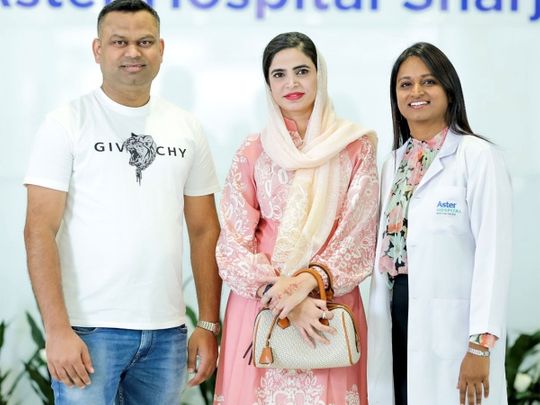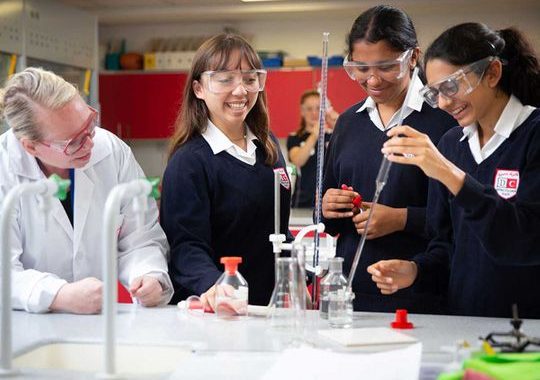Heart health alert as 31-year-old mum suffers cardiac arrest on staycation in UAE

Dubai: The case of a 31-year-old woman who suffered a Sudden Cardiac Arrest (SCA) when she was on a staycation here in the UAE has highlighted the need for even young women to pay heed to their heart health ahead of World Heart Day on September 29.
All was fine for Ajman-based Shahil Rahman Khan, who was recently staycationing in Dubai with her husband, two kids, mum and her brother-in-law’s family. On the day they checked out of their hotel on the Palm, they decided to visit a water park when she started feeling a dizzy.
“We put it down to the heat and decided to go home after she took some rest,” Shahil’s husband Naiyar Alam told Gulf News.
“However, when we were driving back to Ajman, Shahil suddenly complained about having palpitations and a feeling of blacking out. We had reached Sharjah by then, and I decided to drive her straight to an Emergency. Luckily, we were near Aster Hospital, where she had delivered our second baby in January,” he said.
Rushed to the ICU
At the hospital, Shahil was immediately rushed to the ICU as she was unresponsive, said Alam.
Dr. Yogeeswari Vellore Satyanarayanan, Specialist Cardiologist, Aster Hospital Sharjah, said, “The patient had sustained cardiac arrest while returning home from a recreational activity. She was rushed to Emergency at our hospital where she was resuscitated with chest compressions, shocks and cardiac medications to treat her abnormal heart rhythms (anti arrhythmics). She was diagnosed with ARVD (Arrhythmogenic Right Ventricular Disease) – a structural heart problem associated with abnormal heart rhythms which leads to death within seconds if appropriate resuscitative measures are not promptly instituted.”
Much to the shock of the family, she revelaed how ARVD is one of the most under-recognised causes for sudden cardiac death in young people, wherein the right and in some cases, the left side of the heart muscle gets weaker and is prone to abnormal heart rhythms which can prove fatal.
She said, “Cardiac arrest is often sudden and shocking and can happen without warning even in young, apparently healthy individuals. Almost half of the patients who experience cardiac arrest report no symptoms prior to collapsing which makes it even more worrisome. Some may experience palpitation or dizziness prior to the arrest. And in many, it could be the first manifestation like in this case.”
Causes for sudden cardiac death
Apart from acute heart attacks (the leading killer across ages starting from 30 yrs of age), under-recognised structural heart disease, rhythm disorders are important causes for sudden cardiac death in young people. Early identification and treatment, coupled with heart healthy diet and lifestyle can help us avoid such catastrophic complications before it strikes.
Such patients need to be implanted with an Automatic Implantable Cardioverter Defibrillator to protect them from the risk of sudden cardiac death in future.
Shahil, who has had an AICD implanted in her, is thankfully fine now. But as doctors warned her, the disease also has a tendency to be passed onto future generations. So both her kids, a boy and girl, had to be tested for the condition.
“Fortunately, they are fine, but we have been told that they have to undergo the tests every five years,” said Alam.
Warning signs
Dr Satyanarayanan said there are ways of knowing the risk of cardiac arrest even without any symptoms. Some risk factors include:
* Family history of sudden cardiac arrest/death, heart disease or stroke.
* Diabetes/ high blood pressure/ cholesterol/high uric acid compounded by sedentary lifestyle with unhealthy diet habit.
* Palpitation/ dizziness/ shortness of breath/ leg swelling / unexplained cough.
* Chest pain with radiation to jaw/ left arm / upper back.
Avoid high intensity training
“If you have any of the red flag signs, please don’t enroll into any high intensity training programmes or competitive sports without consulting your cardiologist. This can prevent sudden cardiac deaths. Women are usually protected until menopause because of estrogen. However, there are certain gender-specific risk factors which pushes women to have a higher risk of heart diseases like hypertensive disorders of pregnancy, gestational diabetes, polycystic ovarian disease, premature menopause, autoimmune disorders, stress and depression,” she noted.
“Know your heart to take care of it. Unless you know the risk factors prevailing around your heart, how would you prevent them? Identify and screen risk factors, keep your cardiac comorbids under control, follow a healthy diet and lifestyle and go for regular checks with your cardiologist,” she advised.
Dr. Naveed Ahmed, Consultant Interventional Cardiology, Aster Hospital Mankhool, said, “Heart disease is the leading cause of death for women worldwide, and it often presents differently in women compared to men.
“I strongly advise all women to prioritise regular check-ups, maintain a healthy lifestyle, and be aware of their risk factors. By taking proactive steps and seeking timely medical attention, we can significantly improve our chances of preventing heart disease and enjoying a better quality of life.”


